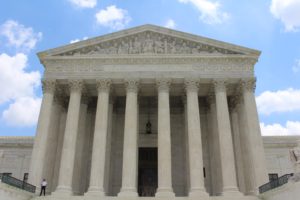
It’s October 31—the day my Presbyterian friends call Reformation Day, but pretty much everybody else calls Halloween. Some
Christians think it’s OK to celebrate Halloween, and others don’t. I’m not going to enter that discussion in this post, but I do want to use the occasion to do a little biblical investigation.
In our culture Halloween is typically associated with fear—haunted houses, goblins, and so on. I suppose an outside observer would find it odd that we humans like to be scared, as long as we know it’s safe—and for some, even because we know it’s not safe.
More seriously, I see a lot of fear in the world around me, fear that seems to come from every direction. In politics, fear of the other guy winning. In health, fear of this or that environmental concern. In parenting, fear of this or that factor hurting my child. Any number of my newsfeed friends comment on a post with a single word: “Scary!”
I’d like to lay out a theology of fear from a single biblical book.
Deuteronomy is at the heart of Scripture. It’s the climax of the Constitution that God himself drew up for his chosen nation. Scholars have noticed that it’s in a specific legal form common in its day, called a “suzerainty covenant.” It establishes a relationship between an emperor and his people, laying out the terms of the relationship—and this covenant is unusually gracious to the conquered people. It puts the lie to the nonsense about the “angry God of the Old Testament.”
And it talks a lot about fear. This very common Hebrew word appears 39 times in 32 chapters in the book—31 times as a verb, 6 times as an adjective, and twice as a noun. And its usage pattern is very interesting.
Did you know that the book says both that we should fear, and that we shouldn’t?
The difference is in the objects.
Here’s what God’s people shouldn’t fear—
- The
wilderness (Dt 1.19; 8.15) - The
Canaanites, with whom they’re about to do battle (Dt 1.21, 29; 3.22; 7.18; 20.1,
3; 31.6), specifically- The
king of Bashan (Dt 3.2) - Occupying
the land (Dt 31.8)
- The
So there’s no need for us to be afraid of our circumstances, or the people who stand in opposition to us.
Hmm. That’s pretty much everything that we fear, isn’t it?
Don’t be afraid.
Not about politics, not about health, not about the environment, not about people.
Let me anticipate an objection. I’m not suggesting that these things aren’t significant, or that they aren’t important. A nation’s political leadership can make life miserable (Pr 28.15), and disease is so devastating that Jesus was moved to heal it (Mk 1.41), and God has given us responsibility to care for creation (Gn 1.28), and sin causes unimaginable grief to God himself.
But we shouldn’t be afraid. We have a heavenly Father, and he is working his plan, and he cares for us (Lk 12.22-32).
God even told his people that the very people they were afraid of were going to be afraid of them (Dt 2.4, 25; 11.25; 28.10). How about that.
But perhaps surprisingly, we’re not supposed to be fearless.
Here’s what God’s people should fear—
- God
There’s only one entry on that list. But Deuteronomy emphasizes this fact far more than the fact that we shouldn’t fear anything else. It gives us lots of information about fearing God—
How should we fear him?
- All our days (Dt 4.10; 6.2; 14.23)
- Intergenerationally (Dt 4.10; 6.2; 31.13)
- By
- keeping his commandments (Dt 5.5, 29; 6.2, 24;
8.6; 10.12; 13.4, 11; 17.13, 19; 19.20; 21.21; 28.58; 31.12) - worshipping him (Dt 6.13)
- swearing by his name (Dt 6.13; 10.20)
- loving him (Dt 10.12)
- serving him (Dt 10.12, 20; 13.4)
- clinging to him (Dt 10.20; 13.4)
- keeping his commandments (Dt 5.5, 29; 6.2, 24;
Why should we fear him?
- Because he is “fearsome” (Dt 7.21; 10.17) and
does “awesome” things (Dt 10.21; 28.58) - Because it results in
- Things being well with us (Dt 5.29; 6.24)
- Prolonged days (Dt 6.2, 24)
My natural tendency is to get all this just exactly backwards. I fear temporary and empty stuff, and I find my heart lacking in fear toward the only one who matters.
But here’s the thing.
Fearing God isn’t like fearing everything else. It’s liberating; it’s beneficial; it’s joyous. It’s what we were designed to do.
It fits.
Oh that they had
such a heart as this always,
to fear me and to keep all my commandments,
that it might go well with them and with their descendants forever! (Dt
5.29)
Photo by Alexandra Gorn on Unsplash

